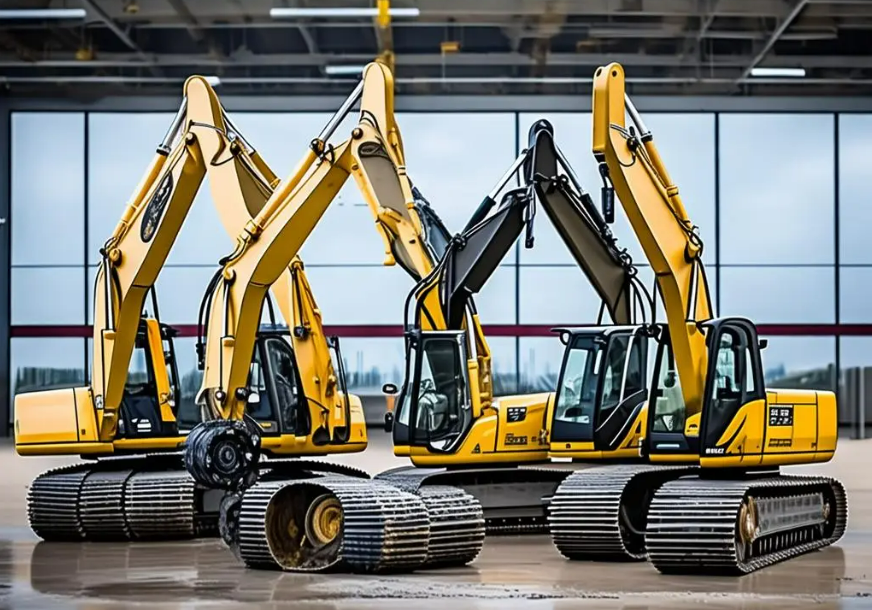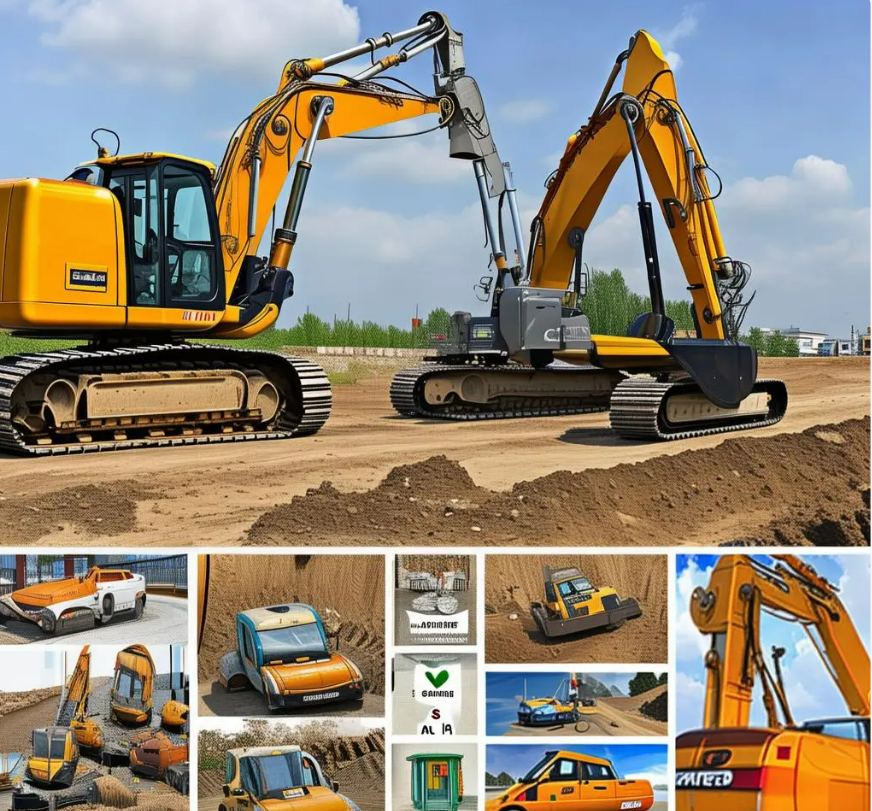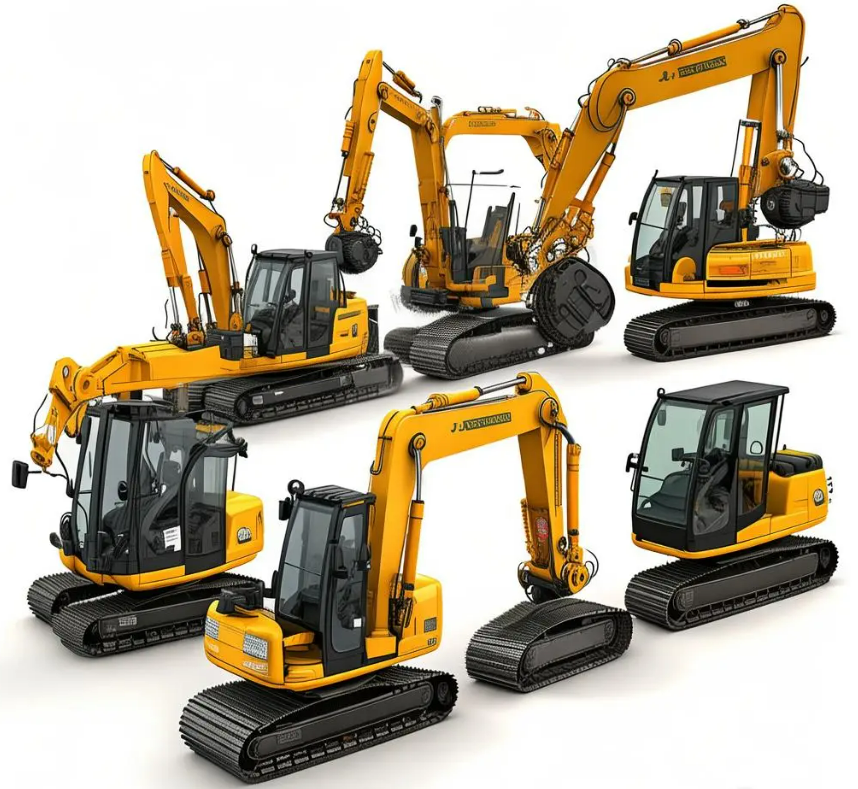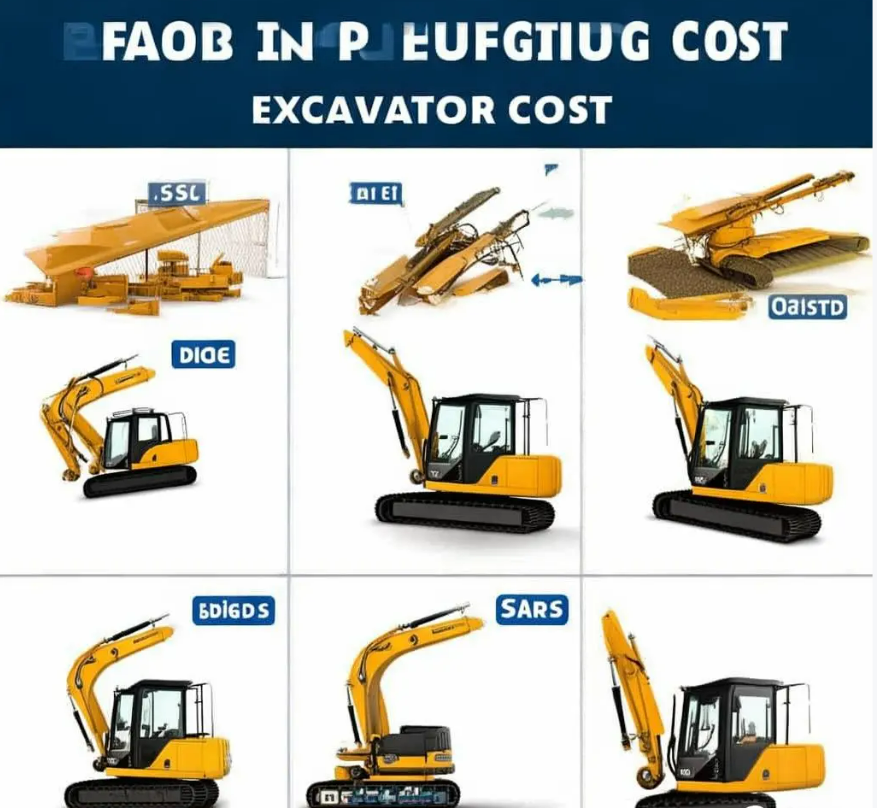Excavators are essential for construction, mining, agriculture, and other industries. In 2024, the cost of purchasing an excavator, whether new or used, can vary greatly based on factors such as size, brand, and whether the equipment is for sale, hire, or rental. In this guide, we will break down the cost considerations of buying, renting, or hiring an excavator, and explore the factors that influence these costs. We’ll also cover the different types and sizes of excavators and help you determine the best option for your needs.
Excavator Cost to Buy in 2024: New/Used + Buy/Rent/Hire Rates
The overall cost of an excavator depends on whether you are buying new, buying used, renting, or hiring with an operator. Here’s a detailed breakdown of these options:

1、New Excavator Prices
New excavators can range from $50,000 to over $500,000, depending on the size, brand, and features. For instance, John Deere agriculture equipment or fm world agricultural equipment models are known for their durability and often come with a higher price tag. Large, specialized excavators or those with advanced technology can cost significantly more. Here is the information presented in table format:
| Brand | Model | Price Range (USD) | Features |
| Caterpillar | 390F L | $1,000,000+ | High-end model with advanced features and technologies |
| Komatsu | PC490LC-11 and up | $500,000 - $900,000 | Large excavators with cutting-edge hydraulics and GPS |
| Hitachi | Top models | $400,000 - $800,000 | Advanced hydraulics, 3D technology |
| Volvo | Top models | $400,000 - $800,000 | Latest technology, fuel-efficient engines |
These prices reflect excavators with the latest advancements in technology, including 3D and GPS guidance systems, advanced hydraulics, and fuel-efficient engines.
2、Used Excavator Prices
Buying a used agricultural equipment like a second-hand excavator can save a significant amount of money, but the cost still varies. A used model can range from $15,000 to $250,000, depending on its condition, age, and the brand. Used agriculture equipment for sale is widely available through dealerships or agriculture equipment auctions, but the price will be influenced by how well the equipment has been maintained. Here is the information presented in table format:
| Hours of Operation | Percentage of New Price |
| 5,000+ hours | 40-50% |
| 0-500 hours | 90-95% |
| 500-1,000 hours | 80-85% |
| 1,000-2,000 hours | 70-80% |
| 2,000-3,500 hours | 60-70% |
| 3,500-5,000 hours | 50-60% |
These percentages reflect how the price of a used excavator typically depreciates based on its hours of operation.

Rental and Hire Rates for Excavators
When you only need an excavator for a short-term project, renting or hiring is often the most cost-effective solution.
1、Excavator Rental Rates
Rental rates for an excavator typically range from $150 to $500 per day, depending on the size and type of excavator. Rentals are usually done through agriculture equipment rental services, and the rates will vary based on the duration of use and the region.
2、Excavator Hire Rates (with Operator)
If you need an excavator for a more specific task, hiring one with an operator may be your best option. Hire rates typically range from $200 to $600 per day, including the operator. This price may fluctuate based on the type of excavator, location, and the complexity of the job.
3、Factors Affecting Excavator Rental and Hire Prices
Several factors influence rental and hire prices, including:
Duration: Longer rental periods often come with reduced rates.
Size and Type: Larger or specialized machines will be more expensive.
Location: Rental prices can vary based on geographic location and proximity to equipment rental centers.
4、Should You Rent or Hire an Excavator?
Choosing between renting and hiring depends on your specific needs. If you need the machine for a longer period and can operate it yourself, rental might be a better choice. On the other hand, if you need the excavator for a short-term project and lack experienced operators, hiring an excavator with an operator may be more convenient. Here is the information presented in table format:
| Excavator Size | Rental Price (Per Month) |
| Mid-Sized (13-20 tons) | $5,700 – $8,500 |
| Large (21-30 tons) | $7,500 – $14,000 |
| Extra-Large (30+ tons) | $10,000 – $22,000 |
| Service Type | Cost |
| Excavator Operator Hiring | $100 – $300 per hour |
| Minimum Charge | Typically one day (8 hours) |

Understanding Excavator Types and Sizes
Excavators come in various types and sizes to meet specific operational needs. Let’s look at some common types of excavators:
Standard excavators are the most common and are used for general purposes like digging, grading, and lifting. These machines are available in multiple sizes, ranging from small to large, and are typically used in construction, mining, and agriculture equipment tasks.
Wheeled excavators are versatile machines that are primarily used in urban environments where mobility and speed are important. These are often used for road maintenance, excavation, and agriculture innovation equipment tasks.
Mini and Compact Excavators
Mini and compact excavators are smaller versions of standard excavators, ideal for tight spaces and small-scale jobs. They are commonly used for landscaping, small construction projects, and in agricultural settings.
Large excavators are designed for heavy-duty tasks such as large-scale construction and mining operations. These machines can handle bigger workloads and often feature advanced technologies and attachments for specialized tasks.
Specialized excavators include long-reach models, which are designed for digging at extended distances, and hydraulic excavators with various attachment options for specific industries like agriculture. fm world agricultural equipment often offers machines that are adapted for specific farming needs.

Factors Influencing Excavator Cost
Several factors can influence the price of an excavator, whether new or used.
Size and Capacity
Larger excavators typically cost more due to their enhanced digging capacity and power. The more powerful the machine, the higher the price.
Brand and Model
The brand and model can significantly impact the cost. Well-known brands like John Deere agriculture equipment or agricultural equipment manufacturers usually command a higher price due to their reputation for quality and reliability.
Age and Condition
A new excavator will cost more than a used one. When buying used agricultural equipment for sale, it’s important to inspect the machine's condition. Well-maintained equipment with fewer operating hours tends to hold its value better.
Technology and Features
Modern excavators come with advanced technology like GPS, telematics, and automatic systems for better performance. Agriculture equipment with these features often costs more upfront but can result in savings on long-term operations.
Attachments and Customization
Customizing your excavator with specific attachments, like buckets, augers, or grapples, will also impact the overall cost. The more specialized the attachment, the higher the price.
Regulatory Compliance
Certain areas may require excavators to meet specific regulatory standards, especially in agriculture. Compliance with these regulations might increase the upfront cost of the machine. Here is the optimized table with some merged cells for better readability and user experience:
| Excavator Size | Price Range (USD) | Examples and Features |
| Mid-Sized (13-30 tons) | $200,000 – $500,000 | Caterpillar 320: $230,000 – $270,000
Komatsu PC210LC-11: $220,000 – $260,000
John Deere 210G LC: $210,000 – $250,000 |
|
| Features: GPS guidance systems, telematics, fuel-efficient engines |
| Large (30-50 tons) | $500,000 – $800,000 | Hitachi ZX350LC-6: $520,000 – $580,000
Volvo EC380E: $550,000 – $620,000
Liebherr R 950: $580,000 – $650,000 |
|
| Features: Advanced hydraulic systems, multiple work modes, enhanced operator comfort features |
| Extra-Large (50+ tons) | $800,000 – $1,500,000+ | Komatsu PC800LC-8: $900,000 – $1,100,000
Caterpillar 390F L: $1,000,000 – $1,200,000
Hitachi EX1200-7: $1,300,000 – $1,500,000 |
|
| Features: High-capacity buckets, reinforced undercarriages, advanced cooling systems |
New Excavator Prices
In 2024, new excavators cost between $50,000 and $500,000, depending on their size, brand, and technology. Smaller, standard models are on the lower end of the price spectrum, while large, specialized excavators can command prices on the higher end. Here is the rephrased information presented in table format:
| Size Category | Weight Range | Price Range (Used) |
| Mid-Sized | 13-30 tons | $50,000 – $150,000 |
| Large | 30-50 tons | $150,000 – $300,000 |
| Extra-Large | 50+ tons | $300,000 – $550,000+ |
Used Excavator Prices
Used excavators can be much cheaper, with prices ranging from $15,000 to $250,000. When considering purchasing used agriculture equipment, make sure to assess its condition, operating hours, and any potential maintenance needs.
Factors Affecting Used Excavator Value
When purchasing used excavators, the following factors determine their value:
Age of the equipment
Usage history
Maintenance records
Brand reputation
Where to Find Used Excavators
You can find used excavators through agriculture equipment dealers, online marketplaces, or agriculture equipment auctions. It’s important to evaluate the equipment’s history and condition to avoid purchasing machines that will require significant repairs.
Rental and Hire Rates for Excavators
Renting or hiring an excavator is often a more cost-effective choice for short-term needs.
Excavator Rental Rates
Rental rates can range from $150 to $500 per day, depending on the size and location.
Excavator Hire Rates (with Operator)
Hiring an excavator with an operator typically costs $200 to $600 per day.
Factors Affecting Rental and Hire Prices
Factors such as location, duration, and machine type influence rental and hire prices.
Should You Rent or Hire an Excavator?
If you only need an excavator for a short period and have no need for an operator, renting may be a better option. However, hiring an excavator with an operator might be more beneficial for complex jobs. Here is the rephrased information in table format:
| Excavator Size | Daily Rate | Weekly Rate | Monthly Rate |
| Mid-Sized (13-30 tons) | $500 – $1,000 | $2,000 – $3,500 | $5,000 – $10,000 |
| Large (30-50 tons) | $800 – $1,600 | $3,000 – $5,000 | $8,000 – $15,000 |
| Extra-Large (50+ tons) | $1,500 – $3,000 | $4,500 – $10,000 | $12,000 – $30,000 |
This table summarizes typical rental rates for excavators, helping you choose the most suitable rental option for your project based on machine size and rental duration.
Additional Costs to Consider
Maintenance and Repairs
Maintaining and repairing an excavator is an ongoing cost. It’s important to budget for regular servicing, which can range from a few hundred dollars to several thousand, depending on the extent of the repairs.
Insurance
Excavator insurance can range from 1% to 3% of the machine’s value annually. Ensure your excavator is covered for theft, damage, and accidents.
Fuel and Operating Costs
Fuel is a significant ongoing cost for operating an excavator. It’s essential to factor in fuel expenses, which can vary based on the size of the excavator and the frequency of use.
Environmental Compliance
Certain agriculture equipment may need to meet environmental standards, leading to additional costs for retrofitting or maintaining compliance.
Cost Summary
Overall, the cost of owning, renting, or hiring an excavator can vary greatly depending on the type and size of the machine, along with factors like usage, location, and the need for additional features or customization. Here is the rephrased information in table format:
| Excavator Size | Hourly Rate (with Operator) |
| Mid-Sized (13-30 tons) | $150 – $250 |
| Large (30-50 tons) | $200 – $350 |
| Extra-Large (50+ tons) | $300 – $500 |
Factors Affecting Excavator Rental and Hire Prices:
Excavator Size and Weight: Larger machines generally come with higher rental fees.
Duration of Rental: Renting for a longer period may result in more favorable daily rates.
Geographical Location: Pricing can differ depending on the region due to varying demand and availability.
Brand and Model: Premium brands or newer models often carry a higher rental cost.
Attachments: Additional attachments or tools provided with the machine may increase the overall rental price.
Operator Services: Some rental agreements include an operator, while others may charge separately for operator services.
Financing Options for Excavator Purchases
Financing your excavator purchase can help spread out the cost.
Loans
Loans are a common way to finance agriculture equipment. They allow you to pay in installments while still gaining immediate access to the equipment.
Leasing
Leasing is another option that allows you to rent equipment for a specified period with the option to purchase at the end of the lease term.
Considerations
When financing, consider interest rates, loan terms, and the impact on your cash flow to determine the best option for your business.
Tips for Reducing Excavator Costs
1. Consider Used Equipment
Buying used agricultural equipment can significantly reduce costs.
2. Optimize Financing
Use loans or leasing options to reduce upfront costs and manage cash flow.
3. Efficient Operation
Properly operating the excavator can reduce wear and tear, lowering repair and fuel costs.
4. Smart Rental Strategies
Rent the excavator for only as long as necessary to save on rental fees.
5. Proactive Maintenance
Regular maintenance helps extend the life of the excavator and reduces long-term repair costs.
6. Shop Around
Whether you’re purchasing new or used, it’s important to shop around for the best deals and consider different financing and rental options.
In conclusion, the cost of buying, renting, or hiring an excavator in 2024 varies significantly based on several factors. Understanding your needs, the type of excavator required, and the financial options available will help you make an informed decision for your project.













